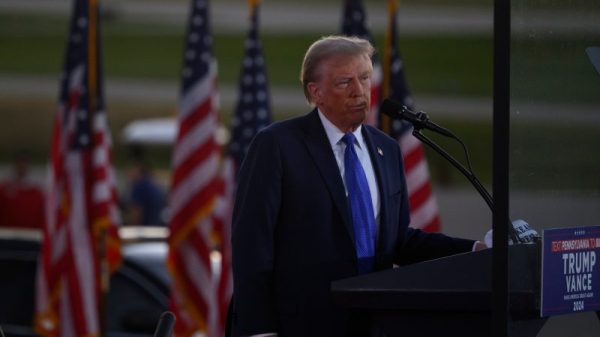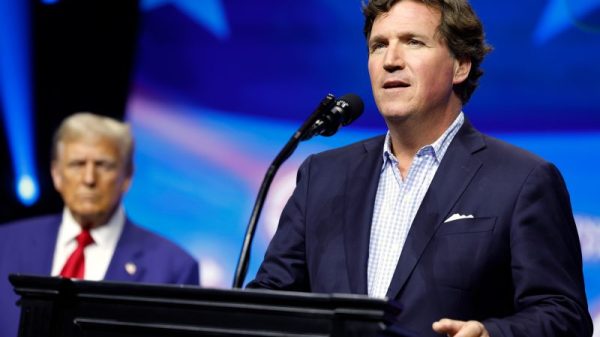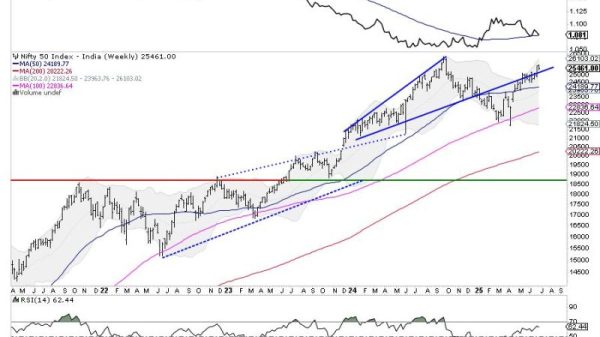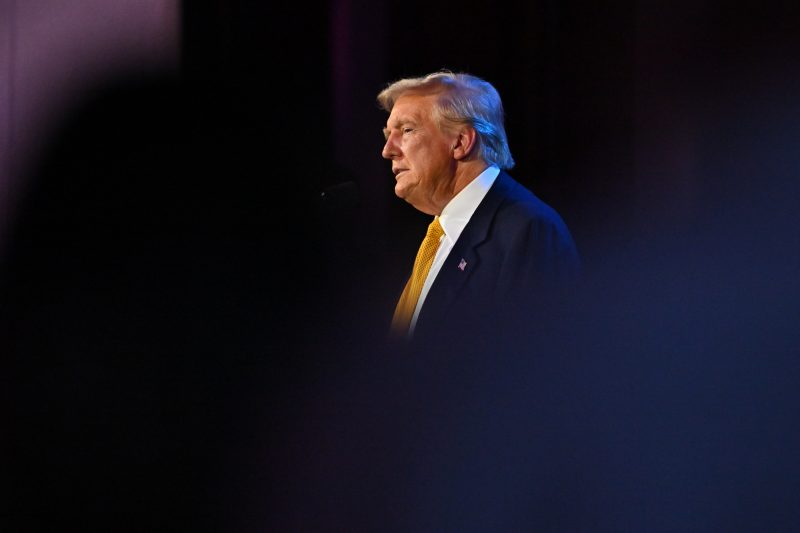Former president Donald Trump’s effort to overturn his loss four years ago and his role inciting the violent attack on the Capitol roared onto the 2024 campaign stage this week even as he continues to suggest he won’t accept a defeat if it happens a second time.
On Tuesday, running mate JD Vance declined to say during the vice-presidential debate that Trump lost in 2020. On Wednesday, special counsel Jack Smith filed an explosive new pleading in federal court surfacing new details about Trump’s lack of concern about the Capitol riot and his push to reverse his loss even as advisers repeatedly told him Joe Biden had legitimately won.
And on Thursday, Vice President Kamala Harris made a campaign appearance in the battleground state of Wisconsin with Liz Cheney, the former Republican congresswoman who lost her seat largely because of her condemnation of Trump’s actions inciting the riot on Jan. 6, 2021.
The injection of the drama of 2020 into this year’s presidential election could mobilize supporters on either side of the race. Trump quickly condemned Smith’s latest court filing on social media as an attempt to “INTERFERE IN THE 2024 PRESIDENTIAL ELECTION” and portrayed himself as a victim of an out-of-control federal prosecution. He returned to the question of the 2020 vote at a Michigan rally.
“We won, we won,” Trump told supporters on Thursday, repeating his long-standing baseless claim. “It was a rigged election.”
But Harris also appears eager to talk about 2020, calculating that reminding the public of the details of Trump’s post-election behavior is helpful to people for whom the memories have faded.
Her Thursday rally in Ripon, Wis. — known as the birthplace of the GOP — featured Cheney giving a detailed account of Trump’s failure to stop the attack on the Capitol, which was intended to thwart the counting of electoral votes that would cement his loss.
Trump “attempted to stay in power by unraveling the foundations of our republic,” said Cheney, daughter of former vice president Dick Cheney, who emphasized that she had never before voted for a Democrat. “We cannot turn away from this truth.”
Cheney is the latest of a long list of Republican supporters that the Democratic nominee has touted for their insistence that Jan. 6 made Trump unfit to be president again. And it was Harris’s running mate, Minnesota Gov. Tim Walz, who elicited Vance’s non-answer on Tuesday about whether Trump lost in 2020 in one of the most combative moments of the vice-presidential debate.
What’s not clear is whether any of it will make a difference in a competitive election in which most voters have already decided who they will vote for, with only a sliver of undecided voters in roughly a half-dozen battleground states likely to decide the outcome.
Democrats won statewide races in those battlegrounds in 2022 on a pledge to defend democracy, and Harris has in her favor the fact that most voters believe that Biden won in 2020 fairly. Reminding voters of how Trump incited violence to block that victory could sway at least some of them.
Polls show that a majority of Republicans — roughly two-thirds — believe Biden stole the 2020 election. The result is different among Democrats and, crucially, independents, however. The Washington Post published a Pennsylvania poll last month that found 55 percent of registered voters thought Biden won the 2020 election fair and square, while 35 percent thought he won due to voter fraud and 10 percent had no opinion.
Registered voters were split on which candidate would do a better job “protecting American democracy,” with 48 percent choosing Harris and 45 percent Trump. Nearly 7 in 10 voters said the issue was extremely important in their vote, topping any other issue. The Post asked the same questions in North Carolina, with similar results.
Trump and his Republican allies, meanwhile, have argued without evidence that fraud will taint this year’s election, too — a clear signal that the former president is unlikely to accept defeat quietly if he loses again.
Trump has told Republican National Committee Chairman Michael Whatley it is Whatley’s job to have the structure in place to be able to challenge results.
“I can get out the vote,” Trump has said privately, according to people who have heard the comments. “You need to protect the vote.”
Republicans have already taken extensive steps to lay the groundwork for potential challenges to the results. Their primary strategy has been to claim, without evidence, that massive numbers of noncitizens are registered to vote and will cast ballots in the November election.
They have filed multiple lawsuits demanding that state and local election officials scour their rolls for ineligible registrations — all of it with the potential to form the basis of election challenges should Trump lose. Research has shown that noncitizen voting is extremely rare.
The RNC has spent considerable time and resources in recent months buying software and examining state voter rolls, hoping to find people who are registered in more than one state, according to people familiar with the work. That work has given them a list of ballots they plan to challenge after the election, the people said.
The GOP has also sought to make it easier for local election officials to question results in the event of irregularities. In Georgia, a pro-Trump majority on the State Election Board passed a rule this summer allowing for local investigations in the immediate days after Election Day. Critics believe the change is intended to allow local officials to delay or refuse to certify results. Democrats have filed a lawsuit seeking to block the rule.
The RNC has claimed to have hired more than 100,000 observers across the nation to monitor polling and counting locations on Election Day. The monitors, the party says, will be trained to challenge suspicious activities and keep extensive logs of any irregularities they see — another potential foundation for post-election legal action.
Trump campaign advisers have urged Trump to talk less about 2020. Arguing the election was stolen and that the Jan. 6 criminal defendants deserve pardons, they say, is not a winning general election issue. His lawyers sought to block the Smith filing from coming out, believing it was potentially damaging to him one month before the election.
“Does it force him to be talking about things once again they don’t want to be talking about? Yeah it does,” said Marc Short, who served as chief of staff to former vice president Mike Pence. “It’s one more day you’re not talking about the border or inflation.”
Short added, however, that while he’s certain Trump won’t accept a defeat, he is less convinced that events will unfold the same way should Trump challenge the results.
“He’ll say the same things this time if he loses, but I really don’t think you’ll have the same response,” Short said. “The conditions are just not the same as they were in 2020, where people were pissed off after covid and the [Black Lives Matter] riots and were cooped up. Do you think the Biden Department of the Interior is going to approve a rally for Trump on the Ellipse on Jan. 6?”
For many Republicans who have endorsed Harris, Jan. 6 was a turning point, allowing them to look past strong policy disagreements with Democrats.
In Cheney’s case, Trump’s campaign has been eager to highlight how she repeatedly criticized Harris as “radical” during the 2020 presidential race. But the Harris campaign believes that only proves the point that Jan. 6 — and the broader issue of democracy — scrambled traditional partisan alliances.
“It’s country over party, but these dweebs wouldn’t get it,” a Harris spokesperson, Ammar Moussa, said Thursday in response to recirculated clips of Cheney attacking Harris four years ago.
Some of the Republicans who have backed Harris do not plan to support Democrats after Trump is gone — and have suggested as much publicly. Former Georgia lieutenant governor Geoff Duncan said during a Republicans for Harris gathering in August that he was backing Harris to “create an opportunity for us to have four years to heal and rebuild” the GOP.
Short said election denialism could be the thing that defeats Trump in the end.
“Every issue set is in our favor, from inflation to border security to the war in the Middle East, and the fact that he’s stayed roughly at 45 or 46 percent the entire time shows that people have formed their opinions about him,” Short said. “We should be in a landslide. It feels similar to 2022 when every issue was at our back, but people weren’t going to vote for election deniers.”
Patrick Svitek in Ripon, Wis., Mariana Alfaro and Scott Clement contributed to this report.





























